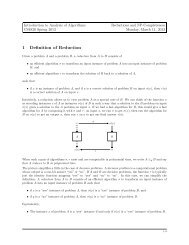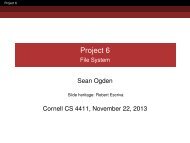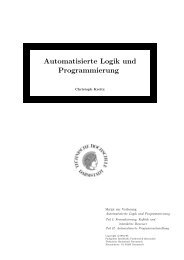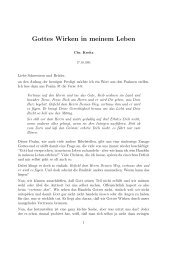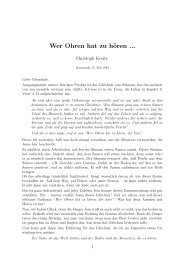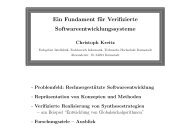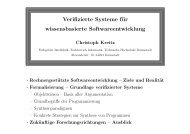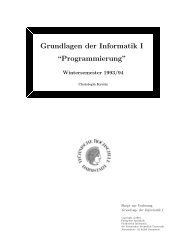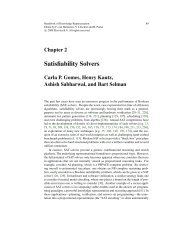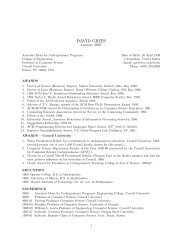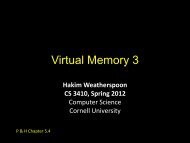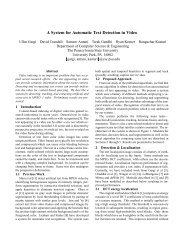Education in Programming David Gries Dr. rer ... - Cornell University
Education in Programming David Gries Dr. rer ... - Cornell University
Education in Programming David Gries Dr. rer ... - Cornell University
Create successful ePaper yourself
Turn your PDF publications into a flip-book with our unique Google optimized e-Paper software.
<strong>Education</strong> <strong>in</strong> Programm<strong>in</strong>g<br />
<strong>David</strong> <strong>Gries</strong><br />
<strong>Dr</strong>. <strong>rer</strong>. nat., Munich Institute of Technology, 1966<br />
Computer Science, <strong>Cornell</strong> <strong>University</strong>, Ithaca, NY<br />
1<br />
1
Abstract<br />
The world is turn<strong>in</strong>g to C,<br />
Though at best it is taught awkwardly,<br />
But we don’t have to mope,<br />
There’s a glimmer of hope,<br />
In the methods of formality<br />
President Mary of Eire<br />
Was supposed to come to regale ya.<br />
But matters of State<br />
Made her cancel that date<br />
So you’re stuck with this guy from Bavaria<br />
A Glimerick of Hope<br />
<strong>David</strong> <strong>Gries</strong>, 1995<br />
2<br />
Well I got my degree at that place<br />
And my ancestors came from that race<br />
Though Great New York C<br />
Was the Birthplace of me<br />
And CS at <strong>Cornell</strong> is my base.<br />
So I don't have a real PhD.<br />
It's the <strong>Dr</strong>. Rer. Nat. that's for me.<br />
And it's from MIT<br />
--On your side of the sea<br />
Munich Inst. of Technolology<br />
2
In 1962–63, <strong>in</strong> Ill<strong>in</strong>ois<br />
writ<strong>in</strong>g the<br />
ALCOR-ILLINOIS<br />
7090 ALGOL Compiler<br />
I came to Munich to get a PhD<br />
(and f<strong>in</strong>ish the compiler)<br />
Manfred Paul<br />
Rudiger Wiehle<br />
Ela<strong>in</strong>e and <strong>David</strong><br />
<strong>Gries</strong><br />
3<br />
3
Instrumental <strong>in</strong> the development of<br />
programm<strong>in</strong>g languages and their implementation<br />
A early as 1952, Bauer: Keller pr<strong>in</strong>ciple<br />
Influential <strong>in</strong> development of Algol 60<br />
Educate the next generation<br />
of computer scientists<br />
1968 and 1969<br />
NATO Conferences<br />
on<br />
Software Eng<strong>in</strong>eer<strong>in</strong>g<br />
(Garmisch and Rome)<br />
4<br />
4
1968 and 1969 NATO Conferences<br />
Software Eng<strong>in</strong>eer<strong>in</strong>g (Garmisch and Rome)<br />
5<br />
5
1968 and 1969 NATO Conferences<br />
Software Eng<strong>in</strong>eer<strong>in</strong>g (Garmisch and Rome)<br />
6<br />
6
Instrumental <strong>in</strong> the development of<br />
programm<strong>in</strong>g languages and their implementation<br />
Educate the next generation<br />
of computer scientists<br />
1968 and 1969<br />
NATO Conferences<br />
on<br />
Software Eng<strong>in</strong>eer<strong>in</strong>g<br />
(Garmisch and Rome)<br />
The Marktoberdorf Summer Schools<br />
now led ably by Manfred Broy<br />
7<br />
7
The teach<strong>in</strong>g<br />
of programm<strong>in</strong>g<br />
simplicity<br />
elegance<br />
perfection<br />
<strong>in</strong>tellectual honesty<br />
Edsger W. Dijkstra Sir Tony Hoare<br />
The competent programmer is fully aware of the limited size of his<br />
own skull, so he approaches the programm<strong>in</strong>g task <strong>in</strong> full humility, and<br />
among other th<strong>in</strong>gs, he avoids clever tricks like the plague.<br />
Two ways to write a program:<br />
(1) Make it so simple that there are obviously no errors.<br />
(2) Make it so complicated that there are no obvious errors.<br />
8<br />
8
Teach<strong>in</strong>g programm<strong>in</strong>g to beg<strong>in</strong>ners, us<strong>in</strong>g Java<br />
Intellectual honesty. Do not teach C or C++ to beg<strong>in</strong>ners, for these<br />
languages lack the simplicity and elegance required. In fact, these<br />
languages get <strong>in</strong> the way of programm<strong>in</strong>g.<br />
Issue: teach structure/organization (OO) first? Or algorithmic aspects?<br />
Pr<strong>in</strong>cipal: Def<strong>in</strong>e th<strong>in</strong>gs before you use them.<br />
S<strong>in</strong>ce almost every l<strong>in</strong>e of a Java program has to deal with an object or<br />
class, we are forced to teach OO ideas first.<br />
Use a programm<strong>in</strong>g environment that does not require a method ma<strong>in</strong><br />
—that is, a complete Java application.<br />
9<br />
9
Order of topics:<br />
How to teach programm<strong>in</strong>g, us<strong>in</strong>g Java<br />
an objected-oriented language<br />
Pr<strong>in</strong>cipal: Def<strong>in</strong>e th<strong>in</strong>gs before you use them.<br />
Teach OO concepts first.<br />
• Expressions, variables, assignments, variable decs (1-2 days)<br />
• objects —creat<strong>in</strong>g them; function/procedure calls (1 day)<br />
• class/subclass def<strong>in</strong>ition, with simple methods that use only<br />
function/procedure calls and return statements (1 day)<br />
• fields, getter/setter methods, constructors, etc.<br />
Throughout, groundwork laid for deal<strong>in</strong>g with correctness concerns by<br />
requir<strong>in</strong>g the use of <strong>in</strong>formal but precise and thorough specifications of<br />
methods and a class <strong>in</strong>variant, which def<strong>in</strong>es the fields.<br />
10<br />
10
Teach<strong>in</strong>g OO requires a suitable model of classes and objects<br />
public class C {<br />
<strong>in</strong>t x;<br />
}<br />
public C(<strong>in</strong>t xx) {<br />
x= xx;<br />
}<br />
public getX() {<br />
return x;<br />
}<br />
Allows one to<br />
dispense with<br />
terms like po<strong>in</strong>ter<br />
and reference,<br />
which students<br />
don’t understand<br />
and which<br />
complicate<br />
Pr<strong>in</strong>cipal: Introduce and discuss concepts<br />
at the appropriate level of abstraction<br />
Pr<strong>in</strong>cipal: <strong>in</strong>troduce names<br />
for items to be discussed.<br />
11<br />
v a0<br />
a0<br />
toStr<strong>in</strong>g() { ... }<br />
x 45<br />
C(<strong>in</strong>t) { ... }<br />
getX() { ... }<br />
Object<br />
C<br />
11
How to teach programm<strong>in</strong>g, us<strong>in</strong>g Java<br />
an objected-oriented language<br />
Algorithmic aspects<br />
Pr<strong>in</strong>cipals: Emphasize correctness concerns<br />
Give a good model of execution<br />
Teach programm<strong>in</strong>g, not programs<br />
m: 0<br />
p1 p2<br />
1. Deeper <strong>in</strong>vestigation <strong>in</strong>to procedures/functions<br />
2. If-statements, local variables<br />
3. Model of execution, <strong>in</strong>clud<strong>in</strong>g a frame for a call<br />
4. Stepwise ref<strong>in</strong>ement<br />
5. Recursion. Emphasize difference between the model of execution<br />
and understand<strong>in</strong>g a recursive function (proof of correctness)<br />
6. Loops: taught <strong>in</strong> terms of loop <strong>in</strong>variants, right from the beg<strong>in</strong>n<strong>in</strong>g<br />
12<br />
t1<br />
frame for call of function m with<br />
pars p1, p2 and local var t1<br />
12
Pedagogy<br />
How to teach programm<strong>in</strong>g, us<strong>in</strong>g Java<br />
an objected-oriented language<br />
1. On first assignments, require mastery. Everyone gets 100/100<br />
• No proper specs on methods? Fix/resubmit<br />
• No suitable class <strong>in</strong>variant? Fix/resubmit<br />
• Test cases not satisfactory? Fix/resubmit<br />
• Bug? F<strong>in</strong>d it, fix/resubmit<br />
Allows beg<strong>in</strong>n<strong>in</strong>g students to make mistakes, usually based on<br />
misunderstand<strong>in</strong>g, without harm<strong>in</strong>g their grade.<br />
Allows students who th<strong>in</strong>k they already know how to program to<br />
overcome bad habits.<br />
2. Give each student at least one 1/2 hour one-on-one session with<br />
<strong>in</strong>structor, TA, or senior-level consultant.<br />
The only way to teach good programm<strong>in</strong>g practices and give the<br />
students an idea of program development.<br />
13<br />
13
On this 40th anniversary celebration<br />
Thanks to those affiliated with the dept <strong>in</strong> some way who<br />
helped shape my life and helped me contribute <strong>in</strong> a small way<br />
J.Stoer R.Bayer W.Niegel M.Broy<br />
W.Brauer S.Braun R.Bulirsh P.Duessen J.Eickel G.Goos<br />
U.Hill P. Kandzia H.Langmaack H.Partsch F.Peischl<br />
P.Pepper C.Re<strong>in</strong>sch G.Schmidt G.Seegmuller T.Strohle<strong>in</strong><br />
M.Wirs<strong>in</strong>g C.Zenger<br />
14<br />
14



